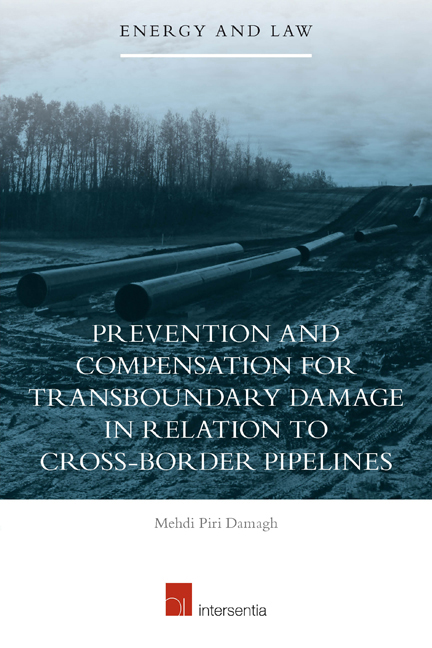Book contents
- Frontmatter
- Dedication
- Acknowledgements
- Contents
- Abbreviations
- List of Tables and Maps
- Chapter 1 Introduction
- PART I INTRODUCTORY ISSUES: PIPELINES, THE NATURE OF RISKS ASSOCIATED WITH PIPELINES AND THEIR REGULATORY REGIMES
- PART II PREVENTION OF CROSS-BORDER PIPELINE ACCIDENTS – MEANS AND SOURCES
- Introductory Note
- Chapter 5 Technical, Safety and Environmental Regulations
- Chapter 6 The Obligations to Prevent Trans-boundary Damage Caused by Crossborder Pipelines
- Chapter 7 An Evaluation of the Safety and Environmental Regulations of Crossborder Pipelines
- PART III STATE RESPONSIBILITY FOR TRANS-BOUNDARY DAMAGE CAUSED BY PIPELINES
- Summary
- Bibliography
- Valorisation Addendum
- Curriculum Vitae
Chapter 5 - Technical, Safety and Environmental Regulations
from PART II - PREVENTION OF CROSS-BORDER PIPELINE ACCIDENTS – MEANS AND SOURCES
Published online by Cambridge University Press: 13 December 2017
- Frontmatter
- Dedication
- Acknowledgements
- Contents
- Abbreviations
- List of Tables and Maps
- Chapter 1 Introduction
- PART I INTRODUCTORY ISSUES: PIPELINES, THE NATURE OF RISKS ASSOCIATED WITH PIPELINES AND THEIR REGULATORY REGIMES
- PART II PREVENTION OF CROSS-BORDER PIPELINE ACCIDENTS – MEANS AND SOURCES
- Introductory Note
- Chapter 5 Technical, Safety and Environmental Regulations
- Chapter 6 The Obligations to Prevent Trans-boundary Damage Caused by Crossborder Pipelines
- Chapter 7 An Evaluation of the Safety and Environmental Regulations of Crossborder Pipelines
- PART III STATE RESPONSIBILITY FOR TRANS-BOUNDARY DAMAGE CAUSED BY PIPELINES
- Summary
- Bibliography
- Valorisation Addendum
- Curriculum Vitae
Summary
INTRODUCTION
As indicated in the previous chapters, certain risks are involved in transporting gas and oil through cross-border pipelines. As discussed in chapter III, there is still a large amount of accidental and non-accidental damage caused by running cross-border pipelines. In fact, pipelines, similar to other industrial activities, cannot be kept completely safe from accidents. As Kandiyoti rightly states, minimizing the number of accidents can satisfy, to some extent, public concerns. Meanwhile, it should be kept in mind that the safety of pipelines can only be achieved by paying an expensive price. which not all actors involved are inclined to pay. Pipeline accidents happen as a result of various failures. According to technical literature, many accidents occur because of technical failures, poor maintenance or external impacts, and were in that sense preventable. For instance, many oil pipeline spillages happened in Nigeria, only because of the low level of safety standards and poor maintenance by MNCs. Other research claimed that according to Post- Soviet Russian statistics, the rate of pipeline accidents is seven times greater than with European pipelines, mainly because of low control and enforcement. There were also some accusations concerning poor maintenance of the Trans-Alaska Pipeline by BP, which led to several oil b leaks in 2006. This report suggested that BP economized on the maintenance of the Trans-Alaska Pipeline.
But of course, as it was shown in Chapter 3, external impacts also contribute as one of the main causes of failure in the case of oil and gas pipelines. Hence, one may argue that a large number of these incidents have occurred due to acts of sabotage and theft. For instance in Nigeria, it was claimed by a Niger delta law- maker that the country is losing about 150,000 to 200,000 barrels of crude oil per day to theft in 2011. Therefore, the prevention of pipeline accidents cannot be achieved only by the contribution of pipeline operators. In many cases, regional or central governments should also take action in order to keep the pipeline safe and environmentally sound.
These various causes of failures inevitably raise the question of how adequate incentives can be provided to actors to prevent the various types of damage that could result from either leakage (usually leading to environmental damage) or explosions (usually leading to personal injury and property damage).
- Type
- Chapter
- Information
- Prevention and Compensation for Transboundary Damage in Relation to Cross-border Oil and Gas Pipelines , pp. 189 - 232Publisher: IntersentiaPrint publication year: 2015

